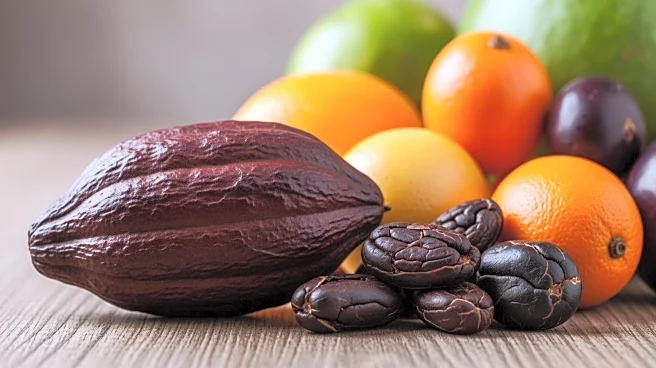What's Happening?
The global cocoa crisis is driving demand for cocoa-free chocolate alternatives, with companies like ChoViva and Win-Win offering innovative solutions. ChoViva uses sunflower seeds, sugar, and plant-based
fats to mimic chocolate's taste and aroma, while Win-Win employs fermentation technology to create cocoa-free products from ingredients like rice and carob. These alternatives are gaining traction amid cocoa price volatility and supply chain concerns, offering sustainable and cost-effective options. The cocoa-free products claim to use significantly less water and generate fewer emissions compared to conventional chocolate.
Why It's Important?
The rise of cocoa-free alternatives is significant for addressing the challenges posed by the cocoa crisis, including environmental impact and price instability. These products offer a sustainable solution by reducing resource consumption and emissions, aligning with growing consumer demand for eco-friendly options. The shift towards cocoa-free ingredients could reshape the confectionery industry, encouraging innovation and diversification. It also highlights the need for sustainable sourcing practices to ensure long-term viability of chocolate production.
What's Next?
As interest in cocoa-free alternatives grows, manufacturers may continue to expand their product lines and explore new markets. The industry could see increased investment in fermentation technology and other methods to enhance the quality and appeal of cocoa-free products. Additionally, regulatory frameworks may evolve to support the development and marketing of these alternatives, ensuring consumer safety and transparency. The ongoing cocoa crisis may prompt further exploration of alternative ingredients and production methods.
Beyond the Headlines
The shift towards cocoa-free alternatives raises ethical considerations about food production and sustainability. By reducing reliance on cocoa, these products address issues related to deforestation and resource depletion. They also challenge traditional perceptions of chocolate, potentially influencing consumer preferences and cultural attitudes towards confectionery. Long-term, the adoption of cocoa-free ingredients could drive broader changes in the food industry, promoting sustainable practices and innovation.








